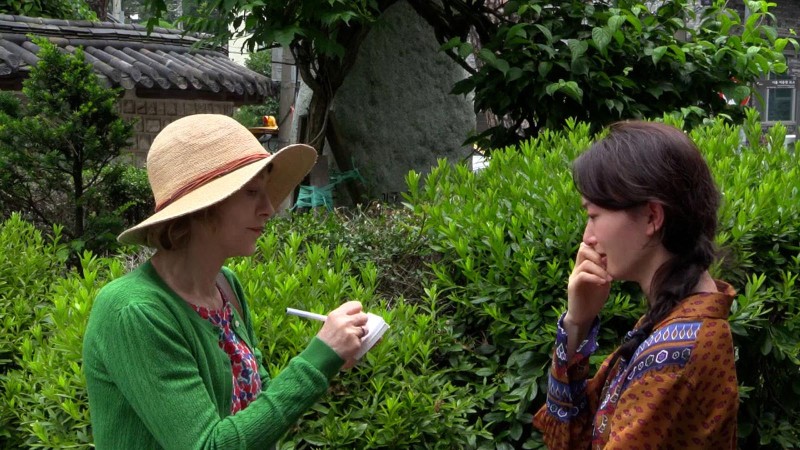Why Is It Going That Way?

Just last month, Jessica Kiang (Sight and Sound) and Jordan Hoffman (Foreign Policy) were singing the praises of a classic that has held up for half a century, and Scott Tobias joined them, writing in the Guardian that “there has been no greater original screenplay in the last fifty years than the one Robert Towne wrote for Chinatown. None more elegantly plotted and politically charged, none more literate and historically evocative, none more pungent in its hard-bitten dialogue and sophisticated in its play on noir archetypes. It’s never easy for a writer to get credit over a director—especially a director as skilled as Roman Polanski at peak form—but Towne’s voice reverberates strongly through a film that perfectly intersects Old Hollywood glamour with New Hollywood revisionism.”
- The eight titles in our Pop Shakespeare program on the Criterion Channel “share an iconoclastic streak motivating big-swing risks in their critiques of and homages to the playwright’s genius,” writes Charles Bramesco in the Guardian. “Personal, expressive, subversive, and insightful about its source, My Own Private Idaho supplies the most teachable exemplar of creative adaptation in condensing the Henriad to the saga of two street hustlers on parting trajectories. In shifting Keanu Reeves’s Prince Hal stand-in to a supporting role as sidekick to his own sidekick, Gus Van Sant coaxes out unseen nuance from the text, imbuing it with newfound passion, world-weariness, and vulnerability . . . Ultimately, this is also how writing stands the test of time—through endless regeneration and reincarnation, torn down and made immortal in the process.”
- In an outstanding piece on Jonathan Glazer’s The Zone of Interest for Verso Books, Jake Romm points to “what prior films about the Shoah have misunderstood: they center the victims, whose plight is incomprehensible, even if it is visualizable.” Glazer casts a disinterested—and therefore, devastatingly effective—gaze on Rudolf Höss, the commandant of Auschwitz, and his family. “The visual language of Holocaust Film looms large,” writes Romm, “because of its subversion, because of its absence. Just as Glazer refuses to film the interior of the camp while preserving its omnipresent soundscape, he also refuses, in a way, to make a Holocaust film at all. It is this gap between the expectations of genre and the film itself that generate such power, and such discomfort.”
- Along with a generous round of book reviews, the new double issue of Alphaville features two robust dossiers, one of them dedicated to the late music scholar Danijela Kulezic-Wilson, whose “work on sound design and film music has been pathbreaking,” writes editor-in-chief Laura Rascaroli. 100 Years of Disney is the title of the other dossier, and editors Amy M. Davis and Helen Haswell hope that “we have hit the highlights: Disney’s cinema, music, television, theme parks, how it deals with and (re)presents its history, and a snapshot of its interactions with the wider world. The papers we have included here will both deepen your knowledge of the Disney Company and contribute to the ongoing discussion of what Disney means.”
- This month’s Brooklyn Rail offers reviews of Annie Baker’s Janet Planet and Catherine Breillat’s Last Summer; a report on the Architecture and Design Film Festival, which takes place in several North American cities as well as online; Hannah Bonner on the work of Lynne Sachs; and Zoë Hopkins’s conversation with Isaac Julien, whose ten-channel installation Lessons of the Hour (2019) is on view at MoMA through September 28 while 2022’s Iolaus/In the Life (Once Again. . . Statues Never Die) is a highlight of this year’s Whitney Biennial. “I see the camera as an apparatus which created a certain autonomy, the conditions to possess the means to control representation and its reproduction,” says Julien. “I have also always seen photography as a non-neutral technology. Therefore, the intervention that I am making in my works, in my films and images, has always been to uncover this raison d’être of picture-making.”
- Karlovy Vary runs through Saturday, and Steven Soderbergh was recently in town to introduce two of his films, take part in a Q&A with critic Neil Young, and give a typically entertaining and thought-provoking interview to a roundtable of journalists. Georg Szalai was there for the Hollywood Reporter as Soderbergh discussed Kafka (1991) and its 2021 reedit Mr. Kneff, why he prefers books over movies, which of his films he wouldn’t recut (1998’s Out of Sight is one), why he doesn’t fear AI, his upcoming spy thriller Black Bag, and what lies beyond. “I’m thinking about a project in which I analyze large-scale cooperative endeavors,” he says. “Why can’t we figure out Syria, or any other conflict that seems impossible to unwind? It’s clear, we know how to cooperate. So why are we still killing each other at this rate? There are more displaced people on a percentage basis as an aggregate right now in the world than there’s ever been. We have all this technology we have. Why is it going that way?”



